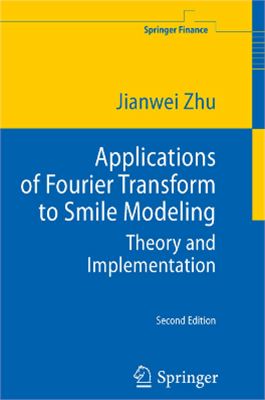Springer, 2009. - 330 Pages.
The sound modeling of the smile effect is an important issue in quantitative finance as, for more than a decade, the Fourier transform has established itself as the most efficient tool for deriving closed-form option pricing formulas in various model classes. This book describes the applications of the Fourier transform to the modeling of volatility smile, followed by a comprehensive treatment of option valuation in a unified framework, covering stochastic volatilities and interest rates, Poisson and Levy jumps, including various asset classes such as equity, FX and interest rates, as well as various numberical examples and prototype programming codes. Readers will benefit from this book not only by gaining an overview of the advanced theory and the vast range of literature on these topics, but also by receiving first-hand feedback on the practical applications and implementations of the theory. The book is aimed at financial engineers, risk managers, graduate students and researchers.
The sound modeling of the smile effect is an important issue in quantitative finance as, for more than a decade, the Fourier transform has established itself as the most efficient tool for deriving closed-form option pricing formulas in various model classes. This book describes the applications of the Fourier transform to the modeling of volatility smile, followed by a comprehensive treatment of option valuation in a unified framework, covering stochastic volatilities and interest rates, Poisson and Levy jumps, including various asset classes such as equity, FX and interest rates, as well as various numberical examples and prototype programming codes. Readers will benefit from this book not only by gaining an overview of the advanced theory and the vast range of literature on these topics, but also by receiving first-hand feedback on the practical applications and implementations of the theory. The book is aimed at financial engineers, risk managers, graduate students and researchers.

